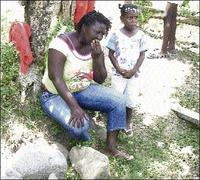Anthony Woodburn, Contributor
Kadian Wallace, mother of Noel Jacks, weeping over her sons murder. - file
The continuous flow of our citizens blood, innocent or otherwise, has fuelled the level of distrust and scepticism in the legitimacy of our administrative system. Statistically, in the 1960s average reported murder was 86; in the 1970s 269; in the 1980s 487; in the 1990s 762, and in the 2000s we are averaging in excess of 1,200 reported murders. Never in our history have we been so terrified by the indiscretion of our very own Jamaican citizens. Some wonder why our society has disintegrated so spectacularly. Why?
We ask this question not because we are stupid or naive. Indeed, we ask out of a sense of disbelief, disgust and disdain. It is with disbelief that we have to contend with daily newscasts revealing decomposing bodies of our women and children who went missing.
Yet, the disgusting behaviour of these perpetrators is highly likely to go unpunished, given our poor cleared-up rate of crime. How then must we not treat our administrative system with utter disdain? The administrative system is ultimately responsible for the security and safety of our citizens. Unfortunately, that is not the reality, as there are strong indications that this is a society in crisis.
Kuhn (1996) argued that crises are necessary preconditions for the emergence of novelty of facts or novelty of theories. Novelty of facts or theories is a necessary condition for the rejection of a paradigm and, as such, the raging debate on the adaptation of new crime measures has got intense. Unfortunately, one does not get a sense of commitment from the main stakeholders, including the administrative system, opposition, NGOs, special-interest groups and academia. Instead, our society is consumed by 19th century Darwinism the weak ones will be destroyed.
DISUNITY IN APPROACH
Both Government and Opposition have taken on a maverick approach towards addressing the challenges of crime generally, and the murders of women and children more specifically. These leaders have surrendered their bureaucratic, legal and political responsibilities (Henry, 1999). They have done so in the interests of personal profiles, partisan politics and pathological arrogance.
Important pieces of legislation that are necessary for reforming the criminal justice system are been hampered by shallow debates, unnecessary criticism, resistance to accepting new learning and a rejection of research methodologies in the decision-making process.
The Government, through the Cabinet, is the head of the administrative system, and so it is incumbent on it to create an environment of peace and security. Our women are fundamental to the existence of humanity, while our children are fundamental to our future. Contrary to the view that in the long run we will all be dead, it is therefore logically consistent to believe that our men must protect our women and children at all cost, in the interest of making our society a better place for the next generation.
The cries have never been so loud, nor have so many citizens blood flowed in peace time, yet, the cries and the flowing of blood continue unabated. How important is that sense of continuity to the administrative system and the opposition?
Jamaican political system
Policy formulation and implementation is not an easy task for a new government, more so within the context of the Jamaican political system. Constant undermining of our democratic tradition is perhaps the main hindrance to the implementation of new ideas, strategies, policies and programmes. One size does not fit all, and there is no one best way in policy formulation and implementation (Taylor in Hughes, 1998). There are various models for policy formulation and implementation (Lane, 2000).
Actors within the administrative system are insistent on a single disjointed approach or just muddling through (Lindblom, 1968). This type of action or inaction (Lynn, 1987) is fuelling a violation of a principle whereby a decision that is taken by the administrative system must make at least one person better off without making anyone else worse off (Pareto in Mishan, 1972).
Contemporary managerial practices within the state apparatus (Hood, 1991) calls for decisive action or consensus building whenever the need arises. The Government cannot be excused for abdicating its responsibilities under the guise of questionable decisions, or its decisions being railroaded by the very actors who are supposed to implement its policies.
This governmental failing is a formula for distrust, inertia and confusion within the society. There are instances where certain unorthodox decisions must be taken by the government, and these may be justified by our international obligations. An absence of adequate explanation is not an excuse and will not be accepted.
Furthermore, the resistance to accepting a new philosophy by stakeholders within the central civil service, who are supposed to be neutral, impartial and anonymous, must not be tolerated either. Procrastination in these defining moments of decision making may be likened to a society that is being watered by the blood of our women and children, the result of which is the opportunity cost of one that is disciplined, peaceful and safe. Perhaps it is now time to reinforce our traditional, social and cultural values of peace.
Peace
There is a strong correlation between peace and wealth (Global Peace Index). Peace creates wealth and wealth creates peace. Our parliamentarians are urged to be responsive and responsible in their deliberations so that they can be held accountable. It cannot be that Jamaica is awash with the fearful rumour that the Government is about to use force in bringing about peace.
The Government must bring about peace, not at all cost, but by policy formulation and implementation that is devoid of degenerative competing ideas and relentless simplicity. Failing which, Jamaica will just be a society that is galvanised by permanent hysteria.
Anthony Woodburn is a policy analyst and researcher. Feedback may be sent to anthony.woodburn@gmail.com or columns@gleanerjm.com.

